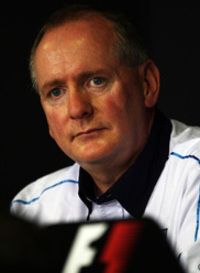F1’s Tweet Race- Mark Gallagher
May 23, 2012
In the week of the Monaco Grand Prix, Formula One’s antidote for austerity, it’s interesting to reflect on the degree to which the competitors in this most elitist of sports have embraced social networking. In doing so, a sport often criticised by fans for being inaccessible appears to have flung open its doors and welcomed everyone to its table.
It’s not surprising that all of the teams and many of the sponsors have sought to use Twitter and Facebook to engage with fans, but the manner in which the F1 drivers themselves have embraced Twitter was unforeseen. Of the 24 drivers competing in this year’s World Championship 21 have official accounts with the vast majority inputting tweets themselves.
Young men, technocentric, early-adopters, generally articulate; F1 drivers have taken to Twitter and begun to interact with fans and media in a way that, only a few years ago, was unimaginable.
The full grid of 24 drivers sports a cumulative total of 4,721,996 active followers at the time of writing, this including the most followed feeds relating to the three luddites who spoil the party by not running their own accounts; Raikkonen, Schumacher and Vettel, the latter explaining that he thinks social networking is impersonal. He’s wrong.
British superstar Jenson Button heads the field with a remarkable 946,071 followers fed a diet of personal tweets about topics including his season, latest triathlon and girlfriend, model Jessica Michibata. Team mate Lewis Hamilton has 812,028 followers which, when combined with McLaren’s 188,625 and those of their test drivers, gives the team a cumulative twitter audience of around two million.
While it’s true that Button and Hamilton benefit both from their huge UK following and status as former World Champions, recent addition Fernando Alonso has already amassed the third highest following with 543,606 and Bruno Senna is next up with 409,393; due in no small part to the huge fascination with the ‘Senna’ brand. Mark Webber, Sergio Perez and Pastor Maldonado each sport six figure numbers, but if you think that fans only follow drivers in competitive cars, HRT’s Narain Karthikeyan and Pedro de la Rosa post equally impressive numbers.
While Jenson is on pole position among twitter’s current F1 community he has some way to go to match the achievement of veteran Rubens Barrichello who has continued to build his audience despite switching from F1 to Indy Racing at the end of 2011. With 1.65 million followers his steady flow of personal thoughts, photographs, insights to family life and passion for on-line gaming sets the benchmark.
Two questions; what’s the point, and can anyone monetise having followers in such numbers? The answer to the first one is that it allows drivers to engage with fans and media in a very direct way, giving them direct input into how the world views them. Perhaps this is why Alonso’s struggling Ferrari team mate Felipe Massa suddenly engaged with social media in the face of withering criticism from the media.
The second question is more difficult to answer, but in the short term at least it ought to translate into merchandising and opportunities for sponsors to build more sophisticated brand associations.
Whatever else happens around the streets of the famous principality this weekend, the fact that most of the F1 drivers will at some point try and summarise their thoughts in 140 characters once again shows the extent of change taking place. Whether any F1 driver will opt to emulate NASCAR driver Brad Keselowski who tweeted while on track during the Daytona 500 this year, remains to be seen, but it has been suggested that in future radio transmissions from drivers to their teams could be automatically relayed in text form.
At a time when CVC Capital is planning to float at least part of F1 on the Singapore exchange, and against a background of uncertainty over traditional television revenues in the future, you can’t help but wonder if the F1 drivers themselves aren’t giving us some useful pointers toward the future development of the sport #interestingtimes.
|
About Mark Gallagher: Mark Gallagher is Managing Director of the CMS Motor Sport consultancy, co-owner of the Status Grand Prix motor racing team which competes in both Le Mans sports car racing and the GP3 feeder-series to Formula One, and an F1 commentator on ESPN Star Sports in Asia. He is also a professional conference speaker on the business lessons to be learned from Formula One, drawing on his experiences in senior management positions in the sport.
You can follow him on @MarkGallagher62 |
{jcomments on}


